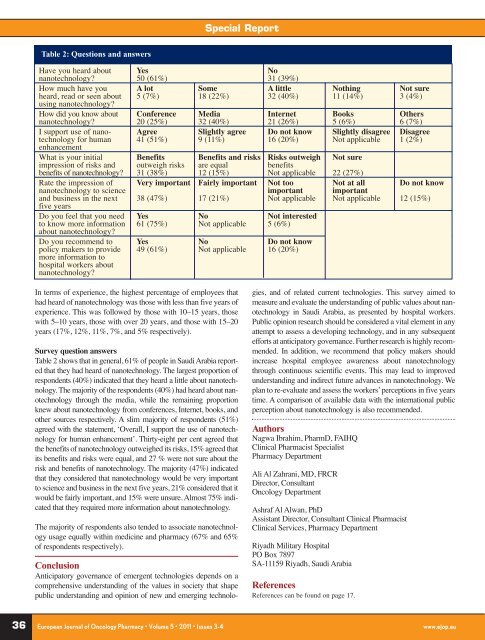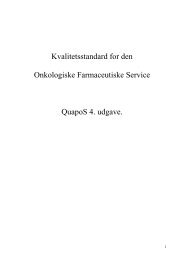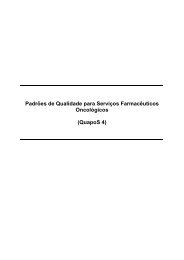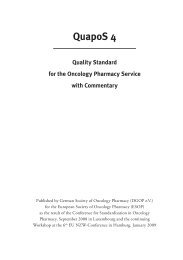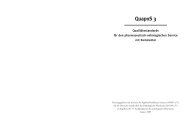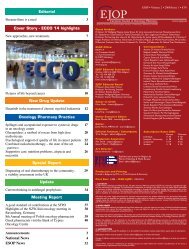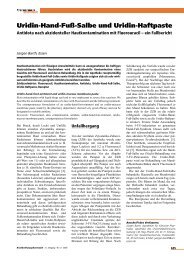Editorial Cover Story ESOP/NZW 2011 Congress Report Oncology ...
Editorial Cover Story ESOP/NZW 2011 Congress Report Oncology ...
Editorial Cover Story ESOP/NZW 2011 Congress Report Oncology ...
You also want an ePaper? Increase the reach of your titles
YUMPU automatically turns print PDFs into web optimized ePapers that Google loves.
Table 2: Questions and answers<br />
In terms of experience, the highest percentage of employees that<br />
had heard of nanotechnology was those with less than five years of<br />
experience. This was followed by those with 10–15 years, those<br />
with 5–10 years, those with over 20 years, and those with 15–20<br />
years (17%, 12%, 11%, 7%, and 5% respectively).<br />
Survey question answers<br />
Table 2 shows that in general, 61% of people in Saudi Arabia reported<br />
that they had heard of nanotechnology. The largest proportion of<br />
respondents (40%) indicated that they heard a little about nanotechnology.<br />
The majority of the respondents (40%) had heard about nanotechnology<br />
through the media, while the remaining proportion<br />
knew about nanotechnology from conferences, Internet, books, and<br />
other sources respectively. A slim majority of respondents (51%)<br />
agreed with the statement, ‘Overall, I support the use of nanotechnology<br />
for human enhancement’. Thirty-eight per cent agreed that<br />
the benefits of nanotechnology outweighed its risks, 15% agreed that<br />
its benefits and risks were equal, and 27 % were not sure about the<br />
risk and benefits of nanotechnology. The majority (47%) indicated<br />
that they considered that nanotechnology would be very important<br />
to science and business in the next five years, 21% considered that it<br />
would be fairly important, and 15% were unsure. Almost 75% indicated<br />
that they required more information about nanotechnology.<br />
The majority of respondents also tended to associate nanotechnology<br />
usage equally within medicine and pharmacy (67% and 65%<br />
of respondents respectively).<br />
Conclusion<br />
Anticipatory governance of emergent technologies depends on a<br />
comprehensive understanding of the values in society that shape<br />
public understanding and opinion of new and emerging technolo-<br />
Special <strong>Report</strong><br />
Have you heard about Yes No<br />
nanotechnology? 50 (61%) 31 (39%)<br />
How much have you A lot Some A little Nothing Not sure<br />
heard, read or seen about 5 (7%) 18 (22%) 32 (40%) 11 (14%) 3 (4%)<br />
using nanotechnology?<br />
How did you know about Conference Media Internet Books Others<br />
nanotechnology? 20 (25%) 32 (40%) 21 (26%) 5 (6%) 6 (7%)<br />
I support use of nano- Agree Slightly agree Do not know Slightly disagree Disagree<br />
technology for human 41 (51%) 9 (11%) 16 (20%) Not applicable 1 (2%)<br />
enhancement<br />
What is your initial Benefits Benefits and risks Risks outweigh Not sure<br />
impression of risks and outweigh risks are equal benefits<br />
benefits of nanotechnology? 31 (38%) 12 (15%) Not applicable 22 (27%)<br />
Rate the impression of Very important Fairly important Not too Not at all Do not know<br />
nanotechnology to science important important<br />
and business in the next 38 (47%) 17 (21%) Not applicable Not applicable 12 (15%)<br />
five years<br />
Do you feel that you need Yes No Not interested<br />
to know more information 61 (75%) Not applicable 5 (6%)<br />
about nanotechnology?<br />
Do you recommend to Yes No Do not know<br />
policy makers to provide 49 (61%) Not applicable 16 (20%)<br />
more information to<br />
hospital workers about<br />
nanotechnology?<br />
gies, and of related current technologies. This survey aimed to<br />
measure and evaluate the understanding of public values about nanotechnology<br />
in Saudi Arabia, as presented by hospital workers.<br />
Public opinion research should be considered a vital element in any<br />
attempt to assess a developing technology, and in any subsequent<br />
efforts at anticipatory governance. Further research is highly recommended.<br />
In addition, we recommend that policy makers should<br />
increase hospital employee awareness about nanotechnology<br />
through continuous scientific events. This may lead to improved<br />
understanding and indirect future advances in nanotechnology. We<br />
plan to re-evaluate and assess the workers’perceptions in five years<br />
time. A comparison of available data with the international public<br />
perception about nanotechnology is also recommended.<br />
Authors<br />
Nagwa Ibrahim, PharmD, FAIHQ<br />
Clinical Pharmacist Specialist<br />
Pharmacy Department<br />
Ali Al Zahrani, MD, FRCR<br />
Director, Consultant<br />
<strong>Oncology</strong> Department<br />
Ashraf Al Alwan, PhD<br />
Assistant Director, Consultant Clinical Pharmacist<br />
Clinical Services, Pharmacy Department<br />
Riyadh Military Hospital<br />
PO Box 7897<br />
SA-11159 Riyadh, Saudi Arabia<br />
References<br />
References can be found on page 17.<br />
36 European Journal of <strong>Oncology</strong> Pharmacy • Volume 5 • <strong>2011</strong> • Issues 3-4 www.ejop.eu


